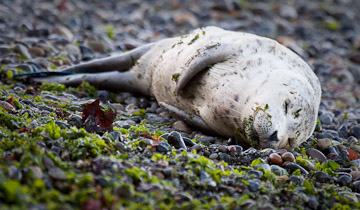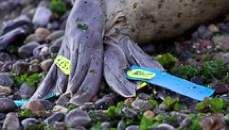Halloween pup at Lincoln Park
Oct/31/09 08:09 PM


Blood samples are tested for diseases and other health perameters. Unfortunately, harbor seals are considered the barometers for the health of Puget Sound. Harbor seals in particular are affected by pollution because they do not migrate, but instead, live year-round in our region and eat smaller fish that live in our waters. These small fish and the organisms they consume contain high levels of microscopic particles of plastic and pollutants. From that contaminated food source, harbor seals’ thick layers of blubber absorb and retain these pollutants from our industrial waterways and storm runoff from agricultural products and waste. Biologists use blubber tissue samples from seals to monitor the health of the Sound, measuring levels of PCBs, increasing numbers of chemicals used in flame retardants (PBDEs), pesticides and other highly toxic waste. In fact, the harbor seals of South Puget Sound are 7 times more contaminated from PCBs than those living in Canada’s Georgia Strait. Read in detail about seals and our polluted waters on our website. View a video where Dyanna Lambourn discusses the contamination of seals in Puget Sound.
Josh and Adrianne from Fish and Wildlife made the long drive from Lakewood to Lincoln Park to do a health assessment on Stella. However, she swam off into the Sound minutes before they arrived ~ perhaps Stella’s idea of trick or treat!







